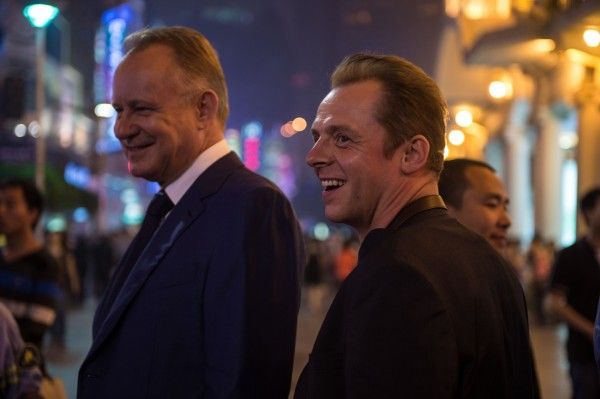Opening this weekend in North America is director Peter Chelsom’s dramedy Hector and the Search for Happiness. Based on the book of the same name by François Lelord, the film stars Simon Pegg as Hector, an eccentric psychiatrist who’s going nowhere and whose patients aren’t getting any happier. One day, he musters up the courage to set out on a quest to find out if happiness really exists. The film also stars Rosamund Pike, Christopher Plummer, Toni Collette, Stellan Skarsgard, and Jean Reno. For more on Hector and the Search for Happiness, click here to watch the trailer, and here's all our previous coverage.
Last week at the Toronto International Film festival I landed an exclusive interview with Rosamund Pike, who plays Hector's wife. She talked about being at TIFF, working with Pegg on The World's End and then Hector, collaborating with Peter Chelsom, if there were script changes during production, if her process as an actor has changed, if she's interested in playing a role on TV, the experience of working with David Fincher on Gone Girl, and more. Hit the jump for what she had to say.
Steve: How are you enjoying TIFF so far?
ROSAMUND PIKE: TIFF has been really great because this film was one of those cases where the Brits didn’t really go for it, in the way that it’s too sort of open-armed and sincere, I suppose. We have a hard time with sincerity, we’re used to everything being cynical or ironic. And this has a sort of childish, fable-like wonder to it. Which is what appealed to me and that’s what I knew we were doing going in, and I thought Peter Chelsom was the right person. But it certainly seems to have found its audience here in North America, people are much more comfortable with this kind of realm than they are in the U.K.
I’ve noticed with my friends that before drinks everyone’s a certain kind of Brit and then after everyone’s been to the pubs, it’s a different group of people.
PIKE: [Laughs] Sure, it’s true. We need to be sort of loosened up. And there’s some transfer overseas, I think the more American fare that comes to the U.K., the more cross-fertilization there is that’s perhaps changing. We’re certainly clear with this movie’s reception that I think people made their opinion. They didn’t really let themselves go on the ride. And I feel with all the journalists here, they’ve gone on a ride and been sort of moved or touched by the film—and really warm, genuinely, it’s been a lovely reaction. So, it’s good, and I love TIFF because I go and see other people’s films.
Was this movie on the horizon when you and Simon were doing The World’s End?
PIKE: It was absolutely on the horizon. It was a film that I’d been committed to for quite a long time. I really liked it. I knew it wouldn’t be a major commitment for me—the Clara portion is contained. I felt that it was the sort of thing that whenever it was ready to go, I could fit it in. Simon and I did know about this when we went into The World’s End. We sort of said, “The next six months, we’ll get to work together.” Which is great. And we have this very easy, very joyous friendship. It’s really nice.
What was it like doing The World’s End compared to this?
PIKE: It was very different. Peter Chelsom and Edgar Wright are totally different directors and worlds apart, but both really accomplished directors who are certain of how they want to make a film. Peter’s obviously made some very remarkable films like Funny Bones, Hear My Song, and I think for him, he’d say that this feels like going back to what he really wants to do. This is authentically what he would like to put his name on as Peter Chelsom film, which is great. Peter is much more of a “nurturing actors” director. He’s been an actor, he’ll coax you through it, he’s more a sort of therapist-style director [laughs]. He’ll be supportive and if you need to emotionally go somewhere, he’ll help you through that. Some directors are sort of, “That’s your business, you get on, you do that by yourself and I’ll just be here.” I mean, both things work.
I just worked with David Fincher, he’s someone who’s not the person you cry on the shoulder of but he’ll be 100% supportive and he’ll persevere until everyone’s happy. But he’s not going to be this little, warm, fuzzy director that you’re gonna cuddle up to.
How much has changed in the script from when you first got involved in the project to what people are now seeing on screen?
PIKE: Not really anything changed about the character. You talk to the producer, you get a very different story. She’s been with this source material for ten years and then came and finally found Peter, who was not only the filmmaker to bring it to life but also the screenwriter. And Peter’s very funny. There’s this theme of childhood running through it and you feel that Hector, as he does his adult musings in his journal, there’s some of his drawings that you feel he’s been drawing since he was a child. He’ll be looking out the window of a plane and then it cuts to this boy child in the window, and the plane is drawn. People say to Peter, “How did you come up with that? We love it.” And he goes, “Well, you know, if you can’t afford to film the outside of a plane, you draw it.” And thereby a sort of rather happy and wonderful thing is born. It becomes something that you can run through the whole movie. It brings that sort of heightened, slightly charming reality to it, which I actually love that. I find it weirdly moving for some reason. I find the way Hector contacts the little boy in himself very touching—the inner child, I suppose.
I’ve spoken to a number of directors who say sometimes budget limitations are the greatest form of ingenuity.
PIKE: Yes, I think lots of directors would say that. It’s the Greek formula, that you contain the interaction within a certain time frame and a certain location, then the more you restrictions you place, the more your imagination can expand within those containment restrictions. I know that was true of Greek tragedy, anyway. What were we saying before that? Oh, how much it’s changed. I mean, Clara, I just felt I could do something with her, really. I felt I understood and I was quite interested in exploring this idea of a woman and a modern couple who’s in love and happy, and very content but is very fearful of taking things to the next step.
You get those couples who are very fearful of bringing children into the mix because they feel like somehow that link between them as a couple is going to somehow dissolve or become less powerful or whatever. And that somehow the child is going to disrupt their happy stage. Of course it is true [laughs], that’s exactly what a child does but it’s not something to be feared, it’s to be embraced. I think Clara is a particular, fearful type who thinks that happiness is to do with containment and controlling in a very sort of sweet way. But her and Hector are completely codependent. She repairs any little mistake he makes and he’s happy to let her do that. So, they reach this understanding in the end. She goes on her own profound journey during the course of the film, to the point that she admits that she could be a mother. Which is a big, big thing but we just don’t see it. Obviously, I had to deal with all that and go there.
Has your preparation process as an actor changed as your career has gone on? Has it stayed the same or have you refined it?
PIKE: No, I think it’s sort of stayed the same. I think I’m much freer than I used to be. I think I’m getting better, thank God, I hope. I do know that the key to anything good is feeling relaxed and free. That’s the main thing that you can offer yourself as an actor. Sometimes I think, with these supporting roles, you do put as much thought into fleshing out the character in your mind and then you can be rather dismayed that people don’t really see so much in the screen. Because ultimately you’ve only got the screen time that the screenplay allows you. That’s why I’m sort of relishing doing some more meaty films.
Well right now, in my opinion, television is the best it’s ever been.
PIKE: Absolutely.
There are so many amazing roles and so many amazing characters.
PIKE: But the time frame scares me, the pressure on the speed at which you shoot—not the time frame, not the commitment, but the amount of stuff to be covered in a day. With a film like Gone Girl we had the luxury of—because David pares his crew down so much, we had the luxury of an action movie schedule for a drama. We had length of time to play, and obviously in this movie Peter made sure that we had all the time we needed to go where we needed to go, and I really value that. That’s the only thing that always—I’m sure you get into it. I did a foray into some British television a couple of years ago, because there was a writer who wrote Made in Dagenham, which is a film I did and I just loved saying his words, I loved his writing so much. And he did an adaptation of a D.H. Lawrence novel for British TV, which I wanted to do. But the speed at which we had to go and the amount of material to cover in a day was so daunting.
What was the experience of working with David Fincher like? Did you relish doing the 50 takes?
PIKE: You can guess from my answer about the television. I sort of relish that, I crave working in that kind of way. I’ve been on stage plenty of times and one of the things about being a stage actress is you have a 3-month run to revisit the story nightly and play it again. So, I never felt frustrated and I felt that it was amazingly liberating. I never left set with the feeling that is the habitual feeling that, you usually think, “Why didn’t I think about doing it that way?” I never had that feeling because you’ve kind of tried it, you’ve done it, and you’ve really mined it.





